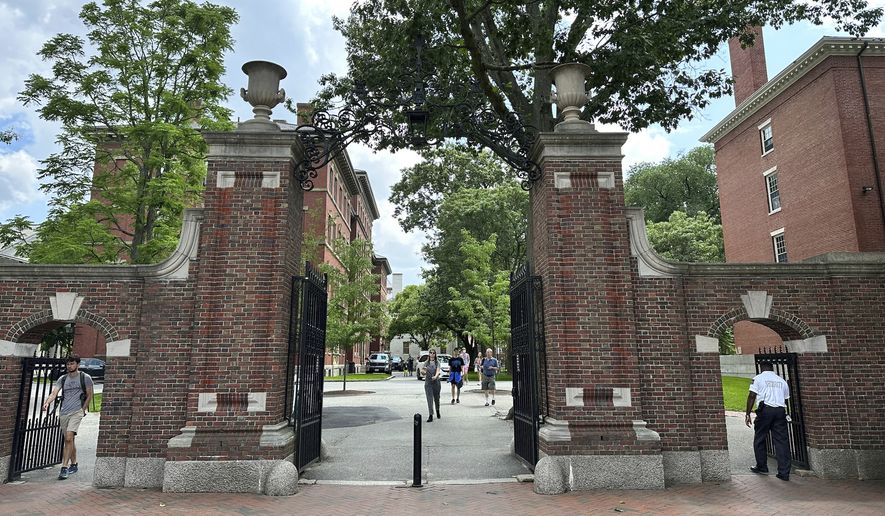Civil rights advocates filed a challenge Monday to Harvard University’s legacy and donor admissions policies, calling them unfair giveaways to “mostly White” students.
Of the applicants from donor and legacy families, nearly 70% are White. That results in preferential treatment over Asian American, Black and Hispanic applicants, they say.
The civil rights groups argued that eliminating those preferences is one way for the school to maintain or boost Black and Hispanic enrollment after the Supreme Court struck down the school’s race-based affirmative action program as unconstitutional.
“The fact is that, if the Donor and Legacy Preferences did not exist, more students of color would be admitted to Harvard,” said the complaint, led by the Chica Project, African Community Economic Development of New England and the Greater Boston Latino Network.
The Boston-based Lawyers for Civil Rights filed the complaint with the U.S. Education Department on behalf of the groups.
The case uses data that came to light in the affirmative action case that showed the heavy advantages of donors and legacy applicants. Lawyers for Civil Rights said donor-based applicants are nearly seven times more likely to be admitted than non-donor applicants and legacy applicants have a sixfold advantage.
Harvard is bound by Section VI of the Civil Rights Act of 1964, which forbids racial discrimination by an entity that receives significant federal funding. Harvard gets federal grants and federally backed tuition assistance.
The groups asked the Education Department’s civil rights office to investigate and declare the use of legacy and donor preferences illegal. The groups demanded that Harvard stop using donor information and asking about legacy relationships altogether.
“Harvard’s practice of giving a leg-up to the children of wealthy donors and alumni — who have done nothing to deserve it — must end,” said Michael Kippins, the lead attorney in the case. “Particularly in light of last week’s decision from the Supreme Court, it is imperative that the federal government act now to eliminate this unfair barrier that systematically disadvantages students of color.”
The challenge raises an interesting question for the Biden administration, which must rule on Harvard’s policies.
Harvard declined to comment on the complaint but referred to its statement after the Supreme Court ruling last week in which the school “reaffirmed its commitment to the fundamental principle that deep and transformative teaching, learning, and research depend upon a community comprising people of many backgrounds, perspectives and lived experiences.”
The school also pointed to a section of the court’s ruling saying that granting a preference based on race alone is unconstitutional but judging an applicant individually, including any hardship or inspiration derived from race, is allowed.
Some observers have speculated that schools could try a workaround for the high court’s ruling by prodding Black or Hispanic students to focus on race in application essays.
The legacy and donor admissions changes offer a more immediate path with striking support across the ideological spectrum.
Students for Fair Admissions, which successfully challenged Harvard’s race-based policy, said schools should end alumni and donor preferences.
Edward Blum, president of the group, said preferences for athletes and relatives of faculty and staff also should be on the chopping block.
He said schools have clung to such policies despite evidence that they hurt student diversity.
“The elimination of these preferences is long overdue and SFFA hopes that these opinions will compel higher education institutions to end these practices,” Mr. Blum said.
In his concurring opinion last week, Justice Neil M. Gorsuch, a Harvard Law School graduate, wrote that Harvard could “nearly replicate” its current racial composition by eliminating the preference for donors, alumni and faculty and by providing a slight “tip” to socioeconomically disadvantaged applications.
He said Harvard “resisted this proposal.”
He said relatives of donors, alumni and faculty make up 5% of applicants but 30% of admissions.
In an internal study of race-neutral admissions policies, Harvard cast doubt on its ability to change demographics by eliminating donor and legacy preferences. Harvard said such an admissions policy change would not be “nearly enough to compensate for the sharp decline in diversity” from losing its race-based affirmative action approach.
The school defended alumni admissions as a way to keep graduates “engaged with the college for the rest of their lives” and the donor policy as critical to keeping the school atop the rankings.
“Although alumni support Harvard for many reasons, the committee is concerned that eliminating any consideration of whether an applicant’s parent attended Harvard or Radcliffe would diminish this vital sense of engagement and support,” the school said in the study, which became public during the court challenge.
In the latest complaint, the civil rights groups said those goals aren’t enough to justify a policy that disproportionately benefits White students.
“It has the largest endowment of any university in the United States, controlling in excess of $50 billion — an amount that is larger than the gross national product of half of the world’s countries,” the civil rights groups said. “To suggest that people will not apply to, affiliate themselves with, or donate to Harvard simply because it eliminated donor and legacy preferences strains logic.”
Correction: An earlier version of this article inaccurately described the legal action. The civil rights groups filed a Civil Rights Act complaint with the U.S. Education Department.
• Stephen Dinan can be reached at sdinan@washingtontimes.com.




Please read our comment policy before commenting.